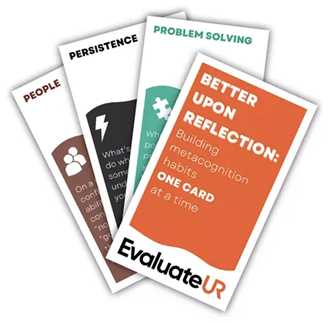by Chris Was, Kent State University
If you have any interest in metacognition, you have likely come across the description of metacognition as thinking about one’s thinking. A number of posts to this blog (including my own) provide evidence to support the conclusion that metacognition can be “learned” and improved. Further, improved metacognition leads to improve self-regulation and positive academic outcomes. There is also a good deal of evidence that training in mindfulness improves cognitive function and attention (e.g., Chambers, Lo, & Allen, 2008). Flook, et al (2010) found that mindfulness-training program improved executive functions in young elementary school students. Zeidan, et al (2010) found that mindfulness training improved executive function and metacognitive insight. This post will focus on the relationship between metacognition and mindfulness.
Let me preface by stating that mindfulness need not refer to esoteric religious beliefs, but it is often defined as a mental state achieved by focusing one’s awareness on the present moment and acknowledging one’s feelings, thoughts and bodily sensations. Kabat-Zinn (1990) describes mindfulness as bringing attention to moment-to-moment experience. In my own work on metacognitive knowledge monitoring, I have required students to make moment-to-moment (more accurately, item-by-item) judgments of their knowledge.. Hypotheses, such as cue-familiarity, provide reasonable explanations for how students and research participants rate feelings of knowing (FOK), judgments of learning (JOLs), judgments of knowing (JOK), etc. However, the simple fact is one must attend to these feelings and thoughts to provide a judgment. In psychological and educational literature, we refer to one using metacognition to make these judgments. Clinical psychology programs such as mindfulness based stress reduction (MBSR) and cognitive behavior therapy (CBT) refer to the patient/participant as being mindful about their emotions, thoughts, and actions. Although the majority of research and application of mindfulness has occurred in clinical settings, there is a great deal of potential in examining the relationship between mindfulness and metacognition.
It isn’t clear how metacognition and mindfulness are related. Some argue that metacognition is not mindful because a true expert in mindfulness does not need to reflect upon his or her thinking, but only to attend to what they are presently doing. I am not convinced. Much of the work on metacognitive improvement has focused on semester long training to improve students knowledge monitoring. The mindfulness research has focused on training students to focus on their moment-to-moment experiences and thoughts. Clearly, there is a relationship between metacognition and executive function, but I have yet to see evidence that training in one improves the other.
One argument made to dissociate mindfulness from metacognition is that metacognitive processes are by necessity reflective or retrospective and that truly being mindful does not require reflection. For example, for a student to practice metacognition during study, she must ask herself, “Do I understand this concept?” Then, depending on the answer the student may or may not adjust the cognitive actions in which she is engaged to learn. This cycle is simply explained by the Nelson and Narens (1990). Now let’s think about a practitioner of mindfulness meditation. While meditating he may chose to focus his attention on the breath. Noticing when he is breathing in and noticing when he is breathing out. During this practice his mind may wander (this is true of even the most practiced at meditation). When this happens, he will gently bring his attention back to the breath. This process, just like that of the studying student, requires one to observe the cognitive processes and exert control over those processes when necessary. This to fits nicely into the metacognitive model offered by Nelson and Narens.
Imagine you are reading a novel on summer vacation. The book is enjoyable, but not a challenging read. Your are enjoying the sun and the sounds on the beach as you read, but suddenly notice you have not really attended to the last couple of pages and are not sure what has transpired in the plot. You choose to reread the last couple of pages and pay more attention. Imagine now you are a student. You are reading a very dull textbook chapter with the TV on and your smart phone near by. A student with little metacognitive resources (whether it be due working memory capacity, attentional control, executive function, etc.) is likely to mind wander (Hollis & Was, 2014). Students in my classes have often told me the hardest part of studying is staying focused, even when the topic is of interest. Ben Hollis and I found that students watching a video as part of an online course were often distracted by thoughts of checking the social media outlets. Not distracted by checking, but just thought of checking them. What if students were practiced at focusing attention, noticing when their minds wander and bringing the attention back to the task at hand?
It seems to me that if metacognition is knowledge and control of one’s cognitive processes and training in mindfulness increases one’s ability to focus and control awareness in a moment-by-moment manner, then perhaps we should reconsider, and investigate the relationship between mindfulness and metacognition in education and learning.
References
Bishop, S. R., Lau, M., Shapiro, S., Carlson, L., Anderson, N. D., Carmody, J., Segal, Z. V., Abbey, S., Speca, M., Velting, D. and Devins, G. (2004), Mindfulness: A Proposed Operational Definition. Clinical Psychology: Science and Practice, 11: 230–241. doi: 10.1093/clipsy.bph077
Chambers, R., Lo, B. C. Y., & Allen, N. B. (2008). The impact of intensive mindfulness training on attentional control, cognitive style, and affect. Cognitive Therapy and Research, 32(3), 303-322.
Flavell, J. H. (1979). Metacognition and cognitive monitoring: A new area of cognitive–developmental inquiry. American psychologist, 34(10), 906.
Flook, L., Smalley, S. L., Kitil, M. J., Galla, B. M., Kaiser-Greenland, S., Locke, J., … & Kasari, C. (2010). Effects of mindful awareness practices on executive functions in elementary school children. Journal of Applied School Psychology,26(1), 70-95.
Kabat-Zinn, J. (1990). Full catastrophe living: Using the wisdom of your mind to face stress, pain and illness. New York : Dell.
Zeidan, F., Johnson, S. K., Diamond, B. J., David, Z., & Goolkasian, P. (2010). Mindfulness meditation improves cognition: evidence of brief mental training.Consciousness and cognition, 19(2), 597-605.



